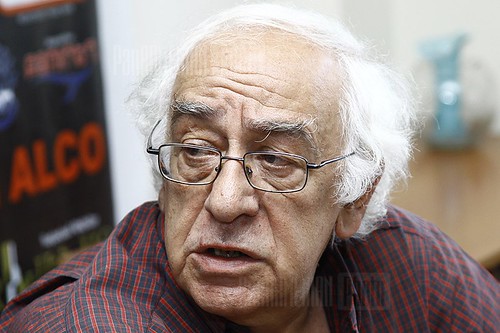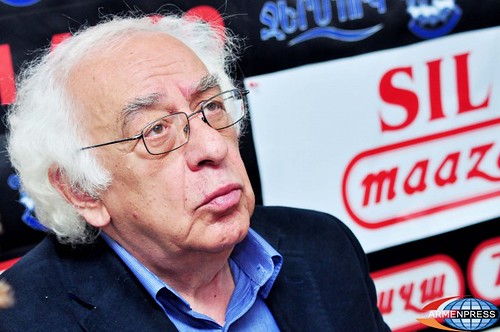Media.am continues its interviews with chief editors of local newspapers on the problems and survival prospects of the print media in Armenia.
At the end of the series, the overall trends will be summarized.
Our interviewee is Azg chief editor Hakob Avedikian.
“Yes, our newspapers will shut down if there are no corporate initiatives”
Azg weekly paper
Founded in 1991 as a triweekly paper; became a daily in 1992, then a weekly in 2014.
Printing: black and white
Price: 200 AMD (about $0.41 USD)
Revenue sources: sales, subscription, “a little advertising” (VivaCell-MTS and the Central Bank of Armenia are regular advertisers). The main shareholder is Armen Abrahamyan (Russian businessman Ara Abrahamyan’s brother). The chief editor’s close friends from the Armenian Democratic Liberal Party (Ramgavar Party) help with donations (mainly from the US). The paper’s cultural supplement is financially supported by Armenia’s Ministry of Culture [about 600 thousand AMD (a little over $1,200 USD) a year].
Online version: since 1999
When Azg went from a daily to a weekly paper, you said about 15 thousand readers of print newspapers remain in Armenia. Has there been any progress in the last two years?
The numbers are decreasing on a very consistent basis. Now we don’t have more than 10–12 thousand readers. I’m talking about readers who buy newspapers.
Of that readership of about 11 thousand, for whom is Azg published?
For our loyal 700–800 readers, who are subscribers or buy the paper.
Mr. Avedikian, is it worth printing a paper for 700–800 people?
If we exhibit a market approach, no, it’s not. But shutting down a paper is difficult — it’s like stabbing yourself. On the other hand, those 700–800 people are people of a different calibre; therefore, it’s worth publishing a newspaper for them…

Why don’t you go door-to-door to get subscribers?
For that you need to hire people. Our employees manage to get to newspaper kiosks periodically to negotiate [and ask], why do you take only three copies of our newspaper to sell and not 10…?
Have you tried to urge readers to help the newspaper, by transferring any money they can?
No, I haven’t. In this case, our main shareholder’s name is an impediment. They say, let him pay. And I have friends who are in a position to make a donation, but they refuse — for something else, mind you. They have given and give for publishing books.
Is advertising more expensive in the newspaper or on the online version?
We don’t have online advertising, because a website updated with content once a week doesn’t interest advertisers, for one thing. Secondly, do we have an advertising market? That which is called an advertising market in Armenia is in a disgraceful state. If this wasn’t so, very many of our few dozen TV stations would no longer exist.
In Lebanon, where I was the chief editor of Zartonk, small and especially medium-sized businesses were the main advertisers, helping the paper get by. Meanwhile in Armenia, if someone has money for advertising, he goes to television, which is more affordable and profitable. It’s horrible. That’s why I always say, television demolished print media’s house. That is, television destroyed our advertising market.
On the other hand, the editors of most of our newspapers have apparently become business managers: they’ve entered into an area they don’t understand. And we at Azg now no longer have such an expert: you have to pay those people highly.
In many other countries, it didn’t happen this way. As though declining newspapers were tied to a rubber rope: they reached a point and now bounce up and down, but here [in Armenia] they fell very low. Why?
Our first financial difficulty came from the bankruptcy of the newspaper distributor Kontakt Press or Haykontakt. On October 27, 1999, its founder, former director of Haymamul Ruben Miroyan was killed. His son-in-law took over and failed.
At the time of the bankruptcy, the debt to us alone was 6.5 million dram [about $13,200 USD]. It was a lot of money for our paper. A lot. At that time about $14,000. That company owed many newspapers.
From the 2000s, we realized that because of these debts, the print media is losing. That was the first blow — we were unable to come out from under that for a long time.

Has the issue of newspaper distribution now been addressed?
No. Newspaper distributors in Armenia absolutely do not and have not had the need to promote, to encourage the sale of this product. The newspaper sells, good; it doesn’t sell, they return it, and that’s it. They don’t suffer any losses.
From the first day this has been the main problem of our print media. From the beginning, this work has not been based on the market. They operated in the Sojuzpechat [RU] style [state retail press distribution system] inherited from the Soviet period and operate [this way] till today.
Has print media in Armenia become helpless solely because of the distribution agencies?
No, we shouldn’t lay all the blame on them. We too were unable, we didn’t have leverage to do what had to be done, to engage experts.
We should’ve saved money in the first half of the 90s, when Azg was being sold at about 42 thousand copies [per issue]. But we were publishing books, doing other charitable actions… the period of electricity shutdowns ended in 96, and the newspaper’s old but very powerful competitor television returned to its place. And then came the internet…
But your website was one of the first in Armenia. Whoever begins first in business can “run” faster and farther. What got in your way?
We probably took on too much. We were publishing in six languages, it ended up being quite costly for us, we had eight translators.
As for the sector overall: Armenia’s periodical press is dealing with a problem of survival. Day to day. There are no funds for development. Development means an entire package to promote sales. In some countries, they get people accustomed to newspapers while in school…
Why should someone else do that and not the paper?
The newspaper must have additional funds to do that. When someone lives day to day, he can’t allow himself these things. Do you know with what small capital newspapers in Armenia are founded?
Someone told me once that he wants to open a newspaper. What do you have, I asked him. He says, two computers, one printer, about $1000. He says there are promises, there will be some help…
With a small capital you can’t open a kiosk today… what kiosk? You can’t even buy a small table. The majority of our newspapers were founded in this way. And they ruined both the entire market and the image of newspapers. They have been forced to remain dependent on this and that person, commissions, and this situation continues till today — let no one insist otherwise.

Azg‘s main shareholder’s brother, Ara Abrahamyan, wants to enter politics in Armenia. Doesn’t this become an order for you?
Absolutely not. We’re just attentive toward his positive activities. After the 2003 parliamentary elections, we had a huge rift. We had accumulated large debts from distributing the election issues for free, which Ara Abrahamyan paid and donated around 15 computers. He helped us a lot to get out of that situation. And not that there was a business agreement — just as an expression of goodwill, we gave him the right of main shareholder.
What do I want to say? When a newspaper is created without capital, it has no prospects, or it has, which means to use one person then another, to take orders, to follow up on orders, to blackmail so that you get… All this is anti-business. I don’t know anyone who works in a healthy business.
Aren’t there any newspapers in Armenia that run a healthy business?
Not that I know of.
When Azg had 42,000 sales, wasn’t it a healthy business then?
It was healthy insofar as people were interested, and we had sufficient income. There were consumers.
With your experience of those years plus at Lebanon’s Zartonk, can’t you now find the key to build a healthy business and especially to bring the readership back?
Readers are different now. My fault is — I repeat — during those good, profitable years, I didn’t foresee the future; we didn’t save adequate money for development. Added to this shortsightedness was the state of our market or the lack of a real market.
If the information sector in Armenia would’ve been in the real business sector, a great many would’ve gone bankrupt. And that would be quite normal. So that it doesn’t turn out that I’m ‘throwing stones in someone else’s garden,’ let me use our example: say, Azg should’ve gone bankrupt, or someone else would’ve swallowed us. This is normal in the world of business. Meanwhile, sponsorship money really does cause damage — the actual business doesn’t grow.
Alongside this, this real Armenian phenomenon of ours was manifest: not to read, to disdain reading. Reading was considered an unnecessary thing.
Professionalism, perhaps, likewise.
No. The real time for professional journalism has come. Now, more so. The online reader today is also a writer, journalist, sometimes even an editor. Who will give verifiable, important news to the public, who will give high-quality commentary, analysis? The best way to fight in this competition is to embrace professional journalists.
But that too costs money.
Of course. But not that much. In the entire world, there are only a handful of journalists who earn a great deal [of money]. The rest, basically don’t make much higher than the country’s average [salary].
A question you’ve been asked probably a thousand times in the last 10 years: will newspapers disappear in Armenia?
Ways to survive can always be found, but getting in the way is our national phenomenon: lazy, lazy, lazy. The Armenian nation suffers from laziness of the brain. It doesn’t want to use it, doesn’t work it. And that’s why it’s gotten rusty.
I, Hakob Avedikian, what steps have I taken to prepare future readers? Yes, newspapers will shut down. the world has settled this issue, we haven’t settled it. We won’t settle it this way. Heads of print media must unite around corporate interests and pursue them.
Interview by Ruzanna Khachatrian






